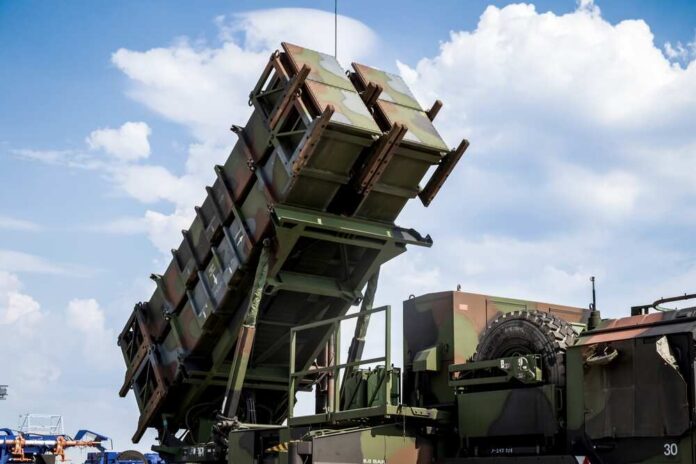
U.S. Deploys THAAD to Israel: A Missile Defense System or a Magnet for Conflict?
In a move that’s sure to ruffle feathers in the already volatile Middle East, the United States has decided to flex its military muscle by deploying the Terminal High Altitude Area Defense (THAAD) missile system to Israel. This deployment, which includes up to 100 U.S. military personnel, is ostensibly aimed at bolstering Israel’s defense capabilities against potential Iranian threats. However, it begs the question: Are we really enhancing security, or are we simply painting a bigger target on our ally’s back?
The THAAD Deployment: A Shield or a Provocation?
The Pentagon’s recent announcement to deploy the THAAD system to Israel comes amid escalating tensions with Iran and its terrorist proxy groups. This sophisticated anti-missile defense system, requiring nearly 100 soldiers to operate, includes 48 interceptors designed to target short- to medium-range missiles. While President Joe Biden claims this move will protect U.S. forces and defend Israel, it’s hard to ignore the potential for this action to pour gasoline on the already smoldering fire of Middle East tensions.
Let’s not forget that this isn’t the first rodeo for THAAD in Israel. A similar deployment occurred in 2019 for “training and an integrated air defense exercise.” But given the current climate, with Iran-backed Hezbollah killing Israeli soldiers and injuring U.N. peacekeepers, this latest move feels less like a routine exercise and more like a deliberate provocation.
At the direction of the President, Secretary Austin authorized the deployment of a Terminal High-Altitude Area Defense (THAAD) battery and associated crew of U.S. military personnel to Israel to help bolster Israel's air defenses following Iran's unprecedented attacks against… pic.twitter.com/P2FJVaOqIt
— U.S. Central Command (@CENTCOM) October 13, 2024
Iran’s Response: Diplomatic Dance or Dangerous Defiance?
Predictably, Iran isn’t taking this lying down. Iranian Foreign Minister Abbas Araghchi has already started beating the war drums, warning that this deployment puts U.S. military personnel at risk. He’s also taken pains to emphasize that Iran has “no red lines” when it comes to defending its interests. It’s almost comical how these diplomatic types can threaten war while claiming they’re trying to avoid it.
But here’s where it gets really rich: The U.N., in its infinite wisdom, is more concerned about attacks on its peacekeepers potentially constituting a war crime than it is about the constant threats faced by Israel. It’s as if they’re living in an alternate reality where Israel isn’t surrounded by enemies vowing its destruction.
The Bigger Picture: America’s Middle East Chess Game
While we’re busy playing missile defense whack-a-mole in Israel, let’s not lose sight of the broader implications. This deployment is clearly meant to send a message to Iran following their attacks on April 13 and October 1. It’s a chess move in the ongoing geopolitical game, but at what cost?
US deployment of the THAAD missile defense system is standard operating procedure and part of an agreed protocol with Israel in the event Israel is attacked by Iran. The US Air Force and the IDF train for this periodically in war games referred to as “Juniper Cobra” that I was…
— David M Friedman (@DavidM_Friedman) October 14, 2024
On one hand, it’s commendable that the U.S. is standing by its ally. On the other, are we not just painting a bigger bullseye on Israel? And let’s not forget the potential blowback. By putting American boots on the ground, we’re essentially daring Iran to make a move. It’s a high-stakes game of chicken, and I’m not sure anyone’s going to come out a winner.
The Bottom Line: Defensive Measures or Dangerous Escalation?
So here we are, deploying high-tech missile defense systems and American troops to Israel in the name of peace and security. But in a region where every action is seen as a provocation, one has to wonder if we’re not just adding fuel to an already raging fire. Are we truly defending our allies, or are we simply setting the stage for a larger, more devastating conflict?
In the end, while the intentions may be noble, the consequences could be dire. As we continue to play this dangerous game of Middle Eastern Jenga, pulling out pieces and hoping the whole structure doesn’t come crashing down, one thing is clear: The stakes have never been higher, and the margin for error has never been smaller. Let’s hope those THAAD operators have steady hands – the peace of the entire region may depend on it.
The deployment of the THAAD in Israel sends a message to Iran that the US has Israel's back but also is meant to send a message to Israel that America has its back and can, therefore, refrain from striking Iran. This is just as much about diplomacy as it is about missile defense.… pic.twitter.com/4TmwhCsaHH
— Yaakov Katz (@yaakovkatz) October 13, 2024














